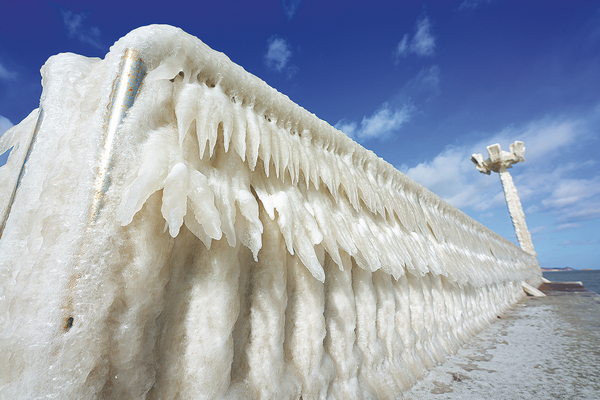

The Cantonese put a special emphasis on dietary tonic. Glutinous rice has the effect of toning the spleen and replenishing qi, the body's innate intelligence according to traditional Chinese medicine. Glutinous rice is sweet in taste, warm in nature, and has the effect of protecting against cold. People in Guangdong steam it, adding a variety of cured meats to enhance the flavor. The cured meat usually includes sausage, chicken and duck. They take a little of each, put them into a clay pot, cook them with the rice, and add a spoonful of soy sauce when serving.
In Jiangsu and Zhejiang provinces, people steam glutinous rice with red bean, barley, lotus seeds, goji berries, longan flesh and red dates over a high heat, and then add sugar to make it into the "eight-treasure rice". It tastes sweet and is regarded as a good treat for guests on dahan. Equally, the Beijing custom of eating cakes made of glutinous rice embodies the same auspicious goodwill, not only because glutinous rice has higher sugar content, it also has the effect of dispelling cold, moisturizing the lungs and strengthening the stomach.
In this cold winter season, stews and soups are added to the daily diet of Nanjing people in Jiangsu province. The traditional "one chicken every nine days" custom since Winter Solstice is still respected by many families. Nanjing people mostly choose old hens, which are either stewed alone, or cooked with ginseng, wolfberry and black fungus.Chicken soup in the cold winter is a real treat. However, perhaps more characteristic of Nanjing is the stewed pork hock with pickled vegetables made during Greater Cold, a delicacy rarely found in other places across the country.
Although the Greater Cold refers to a solar term, folklore expert Liu Xiaochang's recollection of his childhood is quite the opposite. "I was born in Chengdu, Sichuan province. Greater Cold rings the bell for Lunar New Year.Every corner of the city is filled with the lively festive atmosphere, and the strong flavor of Spring Festival blows in our faces," Liu says. "No matter how cold the weather is, it can't stop the enthusiasm of the people for celebrating Spring Festival. We often say 'it's not cold when it's cold'."
The Kitchen God Festival, or Little New Year, the 23rd day of the 12th lunar month usually collides with Greater Cold, so the custom of offering sacrifices to the Kitchen God is naturally indispensable. Legend says zaoshen (or "the god of stove or kitchen") was sent by the Jade Emperor to every home to monitor people's daily good and evil. He returns to the Heavenly Palace at the end of each year to report the people's behavior to the Jade Emperor so that he can reward or punish them.
Therefore, when honoring zaoshen, people put candies, purified water, beans and hay on the table in front of the kitchen god's statue, the last three of which are offered to prepare his mount for the ascension to heaven.When offering the sacrifice, the candies should be melted with fire and applied to the mouth of the statue. The purpose of this is to prevent him from speaking ill. Commonly used written couplets often contain words and sentences such as "kitchen god speaks good things, return to the palace to bring auspiciousness" and "kitchen god speaks good things, and the lower realms on earth keep safe".
As the season often coincides with the end of the year, it naturally has a little more meaning when saying goodbye to the old and welcoming the new. In addition to doing farm work in accordance with the solar terms, people in rural regions also have to run around for Spring Festival, catching up with the temple fair, buying New Year's goods, writing Spring Festival couplets, preparing various sacrificial offerings, sweeping dust and cleaning things, and preparing various Lunar New Year dishes, such as chicken, duck and fish. At the same time, they worship ancestors and various gods and pray for good weather in the coming year.